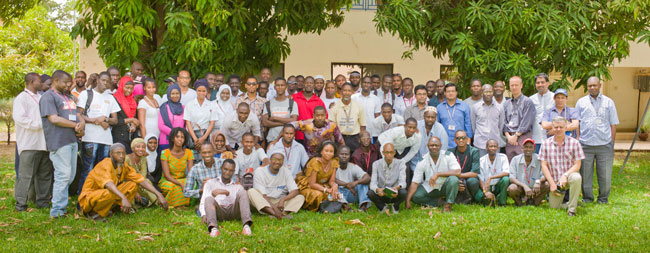 Thursday, 8 June 2017
Thursday, 8 June 2017
A Gambian village. Photo: Philip Hill.
A leading international health researcher at the University of Otago is part of a team that has gained new insights into how much children in Africa can benefit from a vaccine against pneumonia.
Up to one million children aged under five are estimated to die from the disease each year, making it globally the most common cause of death in childhood.
“The incidence rate of pneumonia in African children is up to 10 times that of New Zealand children,” Professor Philip Hill, McAuley Chair in International Health at Otago, says.
“This is most likely due to vulnerability arising from poverty and malnutrition.”
The Gambia Government, through its Ministry of Health and Social Welfare, and the MRC Unit The Gambia have worked collaboratively to determine the impact of the introduction of pneumococcal conjugate vaccines (PCV) on pneumonia.
The report this week in the world's leading infectious disease journal, The Lancet Infectious Diseases, is the first comprehensive evaluation of the impact of PCV on pneumonia in a low-income country.
The Pneumococcal Surveillance Project is led by Principal Investigator, Dr Grant Mackenzie, and was conducted over an eight-year period in Basse, in the rural east of the country.
Professor Hill has played a leadership role in the project from its inception.
The aim of the project is to determine the impact of PCV delivered within the Gambian Expanded Programme on Immunisation (EPI). The data generated will help the introduction and maintenance of the vaccines in other African countries.
The pneumococcal vaccine impact study enrolled 18,833 patients and showed that the use of the vaccine in the Gambian EPI reduced X-ray proven pneumonia in children by 24 per cent, and very severe pneumonia by 61 per cent.
Professor Hill says the study shows the real-life impact of the vaccines in a developing country.
“Reducing the rate of pneumonia will save lives and reduces a substantial economic burden on the health system and families. It was especially pleasing to find that the vaccine preferentially prevents the most severe forms of pneumonia that are associated with the highest mortality.”
Even though the findings were reassuring, there is a need for advocacy for the vaccines in low-income countries that have not yet introduced them, the researchers suggest.
The results should reassure developing countries that spending money on, and delivering, the vaccine with reasonable coverage will reduce rates of severe pneumonia in children.
Other low-income countries that use the vaccines in a routine manner with reasonable coverage can expect significant reductions in pneumonia and substantial reductions in its most severe forms.
The Pneumococcal Surveillance Project is funded by: the Global Alliance for Vaccines and Immunisation's Pneumococcal Vaccines Accelerated Development and Introduction Programme; the Bill & Melinda Gates Foundation; and the Medical Research Council, UK.
The project was done in collaboration with the Ministry of Health and Social Welfare, The Gambia; Medical Research Council (UK); London School of Hygiene & Tropical Medicine; University of Otago; International Vaccine Access Centre at Johns Hopkins University; Murdoch Children's Research Institute, Melbourne; and the Program for Appropriate Technology in Health, Seattle.
The researchers wish to acknowledge the Upper and Central River Region communities, the PSP team, Ministry of Health and Social Welfare, and all partners.

Professor Philip Hill (kneeling, in checked shirt, far right of the picture, at front) and the lead investigator on the project Dr Grant McKenzie (third from right, second row, with light blue shirt).
For more information, contact:
Professor Philip Hill
Centre for International Health
University of Otago
Tel: 03 479 9462
Email philip.hill@otago.ac.nz
A list of Otago experts available for media comment is available elsewhere on this website.
Electronic addresses (including email accounts, instant messaging services, or telephone accounts) published on this page are for the sole purpose of contact with the individuals concerned, in their capacity as officers, employees or students of the University of Otago, or their respective organisation. Publication of any such electronic address is not to be taken as consent to receive unsolicited commercial electronic messages by the address holder.
